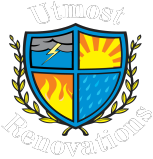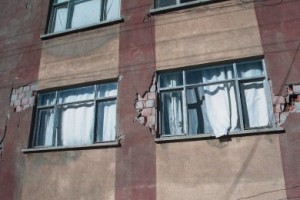Cold Weather Masonry Repairs and Concrete Repairs Don’t Mix Well!
If you have ever done repairs to existing masonry or concrete in cold weather, then you know that it is not easy, cheap, or nearly as good a finished product as if the work is completed in warmer temperatures. In the wintertime, the magic number is 40 degrees Fahrenheit, and few places in the continental U.S. escape experiencing it. According to the Masonry Standards Joint Committee (MSJC) Code and Specification Quality Assurance section and the International Building Code 2003 Chapter 21, when temperatures fall below this magic number — at which time hydration of cement slows or even stops — it signals the point to implement a cold weather masonry construction plan.
While most of today’s masons are well equipped to implement such a plan and provide an acceptable finished product, it is rarely as good a product as if done in warmer temperatures. Cold weather plans and construction include wrapping and heating a structure to keep it above 40 degrees, storing materials inside a heated place, and adding anti-freeze to mortar and calcium to concrete. In turn, these plans and actions increase the costs of masonry and concrete projects by a considerable amount and it’s still preferred to put such work off until temperatures are consistently above 40 degrees Fahrenheit. Often times, there is cause to make repairs in cold weather as a hazard constitutes an emergency situation. But if the repairs can wait, then, by all means, wait for warmer weather. This applies to caulking and sealants, paint, masonry cleaners, water repellents, etc. being installed in cold weather as well.
Why is it preferred to wait? There are many reasons. First, it is more costly to do the work in cold weather as noted above. Second, it is more dangerous to work on the outside of homes and buildings when cold often accompanied with ice and snow creates hazardous conditions. Third, the additives that are usually mixed in with the mortar or concrete changes its chemical composition and alters the curing process to the detriment of the repairs on existing construction or new masonry and concrete installed. Fourth, any slight mishap with the protection plan such as winds tearing off the tented enclosed space or the heater(s) running out of fuel overnight can wreak havoc on the repairs causing it to freeze and flash, fail immediately, as well as an unsightly appearance. Hence, most often times the repairs do not look as good, don’t clean up as well, and fail a lot sooner than if done in warmer temperatures.
You should never do this type of repair work in the wintertime if you have a choice. Many times, masonry and concrete contractors will provide a very good or “discounted” price to their customers for doing winter work but they are actually doing their customers’ a disservice. Let’s be honest, if you are doing such work in cold weather you can’t expect it to be first-rate nor last. I try to steer customers away from doing such things in cold weather as I can’t in good conscious recommend it nor offer a long term warranty on either the workmanship or materials. I usually offer a two to three warranty on most repairs but would never consider doing so for a cold weather repair or application.
Many times, even if a repair is needed during the winter when temperatures are below 40 degrees, minor repairs can be completed to remedy a hazard or leak, etc. but it should only be a temporary repair with the goal to revisit the work to check its integrity when it is warmer and perhaps even plan on re-doing the repair. Poor, less than ideal conditions for such repairs will usually cost you more money as it will have to be done twice in a very short time. Word to the wise, don’t get snowed by doing winter work if you don’t have to!
If you ever need a consultation or exterior masonry and concrete repairs any time of the year it would be wise to call on Utmost Renovations as they have a vast amount of expertise in this area and you can’t afford to hire just anyone for this type of work. Utmost is an A+ accredited business with the BBB and is A rated and a Super Award Winner on Angie’s List, and has lots of strong LinkedIn and Google+ reviews.
Mark Huffer, is President of Utmost Consulting and Utmost Renovations. He is a BOMA (Building Owners and Managers Association) Instructor on building envelopes and member of IFMA (International Facilities Management Association). Mark is a leading authority on Building Restoration and Historic Preservation.
Publishing Rights: You may republish this article in your website, newsletter, or book, on the condition that you agree to leave the article, author’s signature, and all links completely intact.




